The best Bachelor's and Master's theses received the KARL KOLLE Prize at Plant 2 during the graduation ceremony.
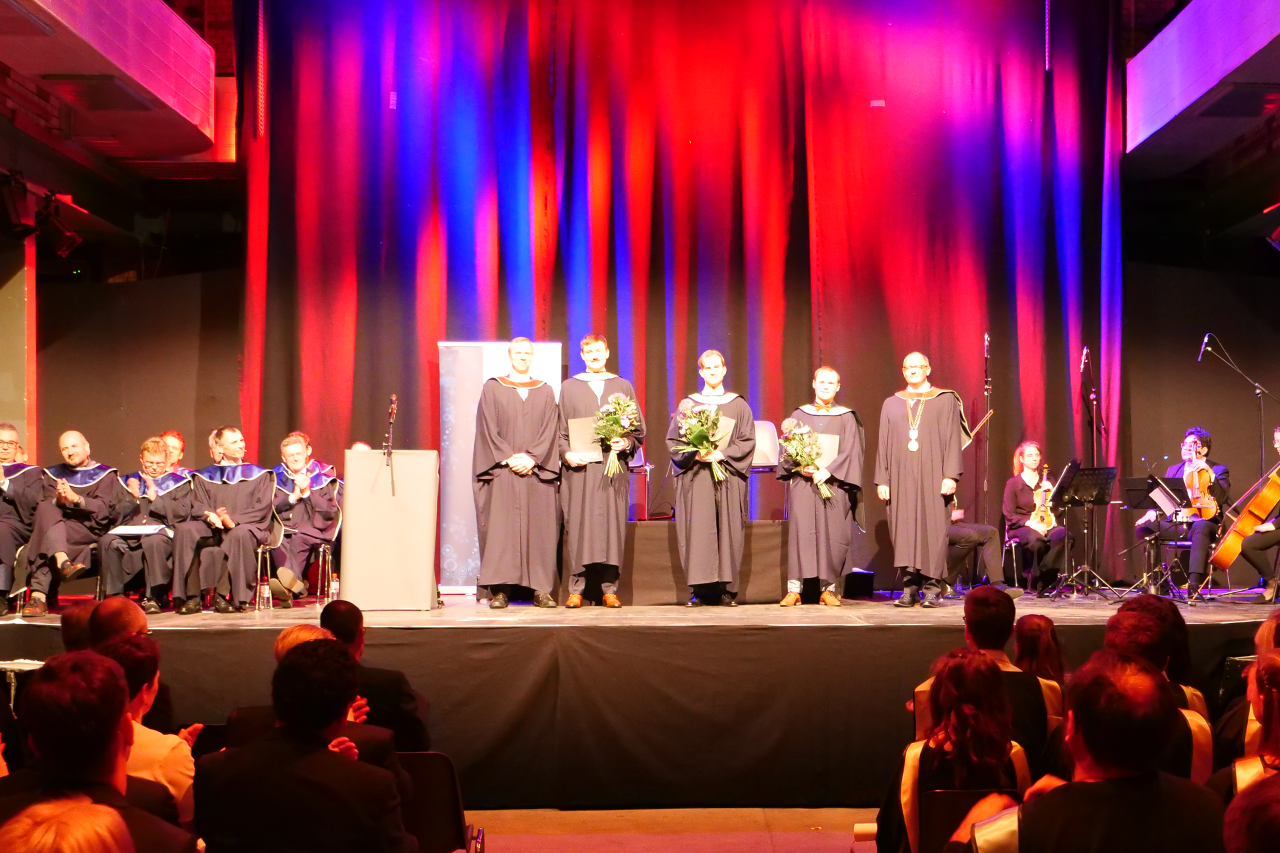
Every spring, the best Bachelor's and Master's theses as well as academic and social commitment during studies are honoured during the graduation ceremony at the Faculty of Engineering. This year, six graduates received the KARL KOLLE Prize at the ceremony in Plant 2 on 13 April 2024.
KARL KOLLE Prize | Bachelor thesis
Tom Sobotta | Energy, Building and Environmental Engineering (cooperative)
Jonas Waselau | Mechanical Engineering
Julian Thomas Ziegler | Electrical Engineering and Information Technology (cooperative)
KARL KOLLE Prize | Master's thesis
Gabriel Kahlmeyer | Mechanical Engineering
Dominic Elias Taraba | Electrical Engineering and Information Technology
Sebastian Walther | Electrical Engineering and Information Technology
The prizes of 500 euros each for Bachelor's theses and 1,000 euros each for Master's theses were presented by the Dean of the KARL KOLLE Foundation in the absence of Prof Winfried Pinninghoff, Chairman of the Board of Trustees.
The prize-winning theses
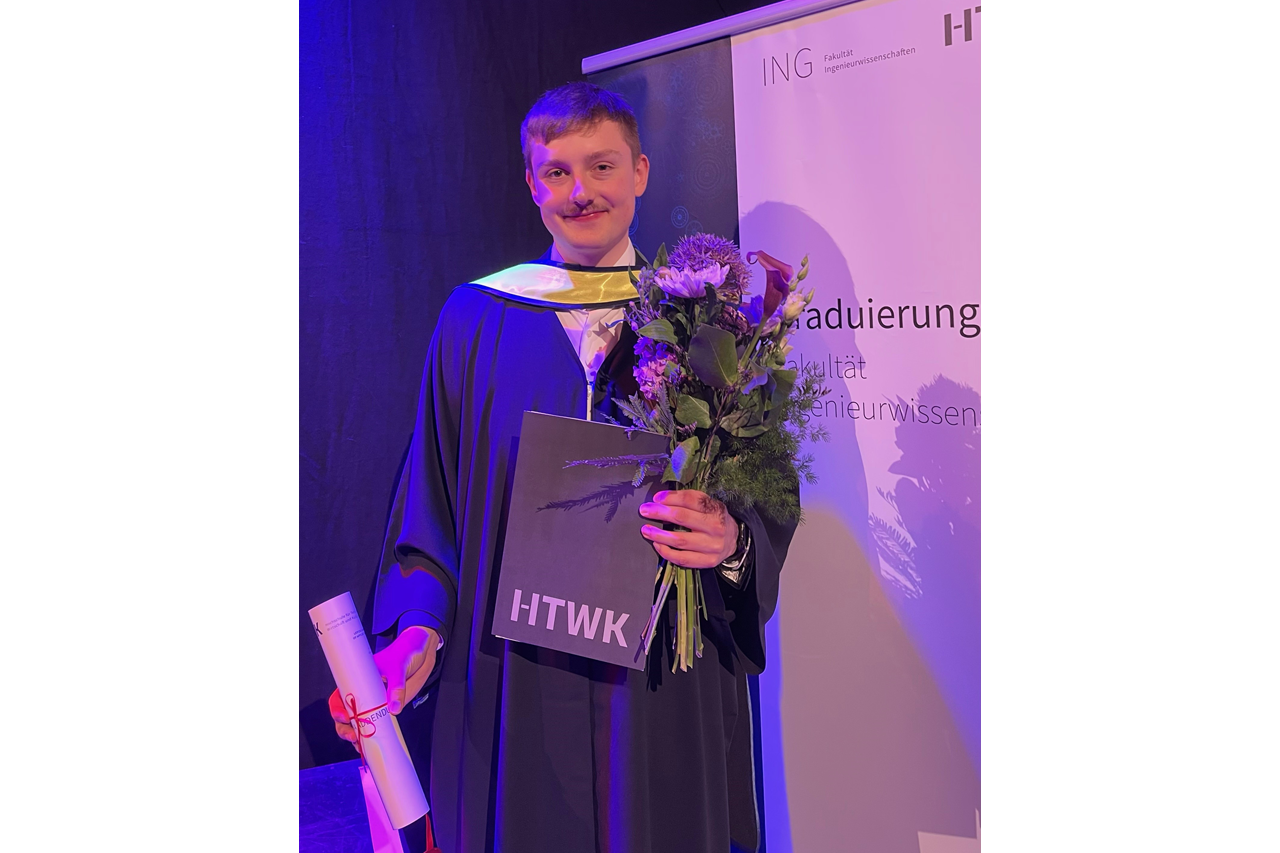
Tom Sobotta | Bachelor thesis Energy, Building and Environmental Engineering
"Commissioning of a test rig to investigate a single-tube latent heat storage system"
The bachelor thesis summarises the basics of thermal energy storage, the state of the art of single-tube latent heat storage systems and the commissioning of a similar test rig.
The aim of the system is to provide process steam for industrial applications. Latent heat storage systems have the potential to store excess heat and release it again on demand. They can therefore adapt volatile renewable energies or different energy supplies in industrial processes to the demand for heat.
In this context, the thesis considers the construction of a unique test rig to experimentally investigate partial load operation and partial discharge of the heat storage systems for the first time and to validate numerical tools. Tom Sobotta's activities included the final theoretical planning steps, as well as practical assembly steps, commissioning and the generation of initial measurement results on the test rig.
This work was carried out in cooperation with the German Aerospace Centre in Stuttgart as part of a doctoral project.
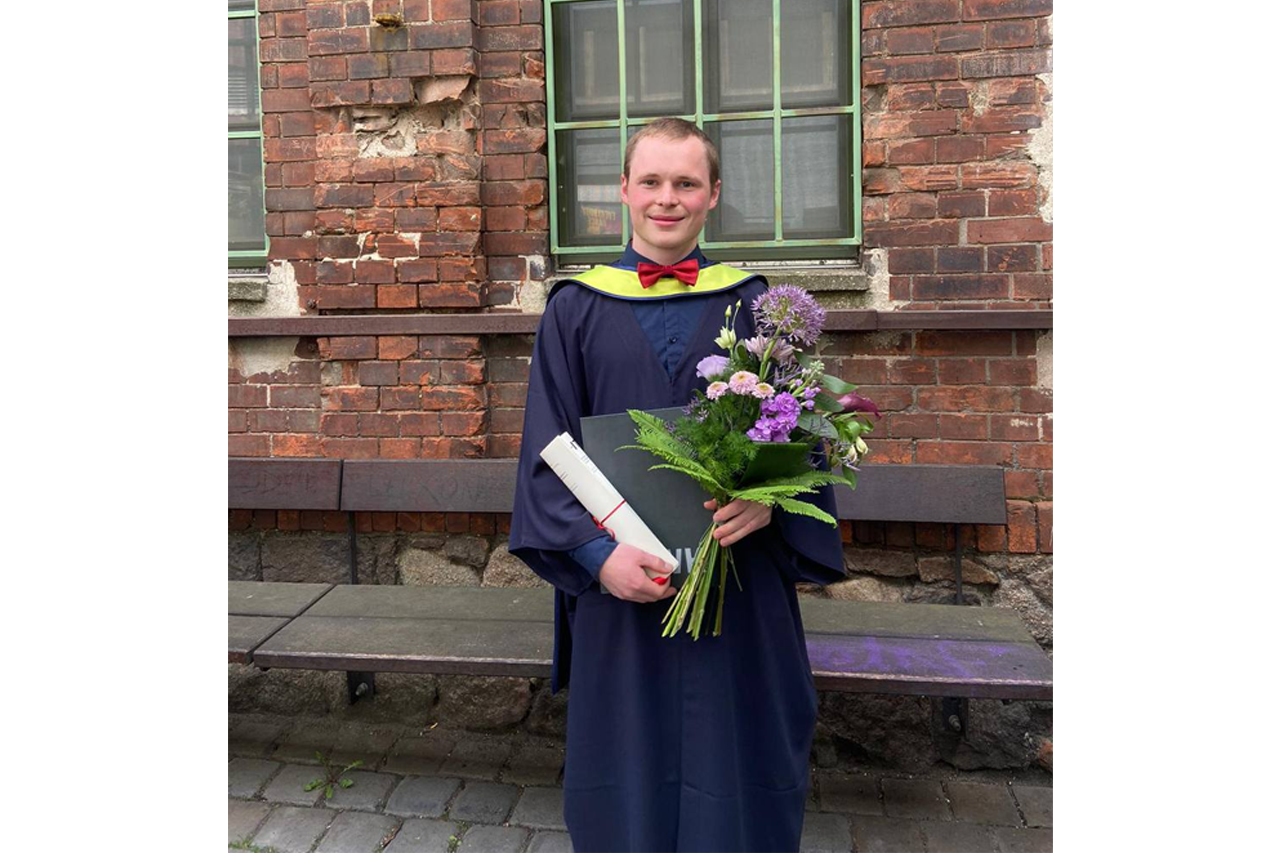
Jonas Waselau | Bachelor thesis mechanical engineering
"Development of a tool-free quick adjustment mechanism for working tools for mechanical weed control"
Jonas Waselau's bachelor thesis is in the field of agricultural engineering. Political decisions, such as bans on selective herbicides and changes due to climate change and the associated dry periods, have led to far-reaching rethinking in agriculture. Hoeing machines in particular have become increasingly important in recent years. The aim of hoeing technology is to remove weeds from crops grown in rows, allowing the crop to grow undisturbed. The aim of the work was to develop a mechanism that enables the width of the hoeing knives on the hoeing machine to be adjusted. This ensures that the position and thus the working width of the working tools is always optimally adapted to the current plant growth, thereby maximising efficiency. By applying the principles of methodical design, a mechanism was developed that enables the working tools to be adjusted quickly without tools.
Julian Thomas Ziegler | Bachelor Thesis Electrical Engineering and Information Technology
"Towards detecting planar projections of a priori known 3d object candidates by means of reinforcement learning"
The bachelor thesis of graduate Julian Thomas Ziegler was written at the Laboratory for Biosignal Processing (LaBP) in Leipzig. His supervising professor was Prof Dr Mirco Fuchs, Scientific Director of the LaBP and Vice Dean for Research at the Faculty of Engineering.
The main aim of the thesis is to test a new approach to object recognition using the reinforcement learning method. Known objects are to be identified from visual information (projection images) and their exact position determined. Graduate Ziegler modelled this goal in a Markov decision problem (MDP), a mathematical model of the interaction between an agent and its environment. In addition to designing and implementing the MDP, Ziegler researched the implementation and fine-tuning of the agent. Ziegler investigated a number of CNN (convolutional neural network) architectures as well as various training methods, including a novel approach that he himself calls DualLR. In the DualLR method, different parts of the network are optimised to varying degrees from learning step to learning step.
The evaluation of the results showed a high increase in performance thanks to the use of the DualLR method. In addition, statements could be made about the applicability of the CNN architectures.
The knowledge gained in Julian Thomas Ziegler's work will be utilised in other LaBP projects and published in a paper in the near future.
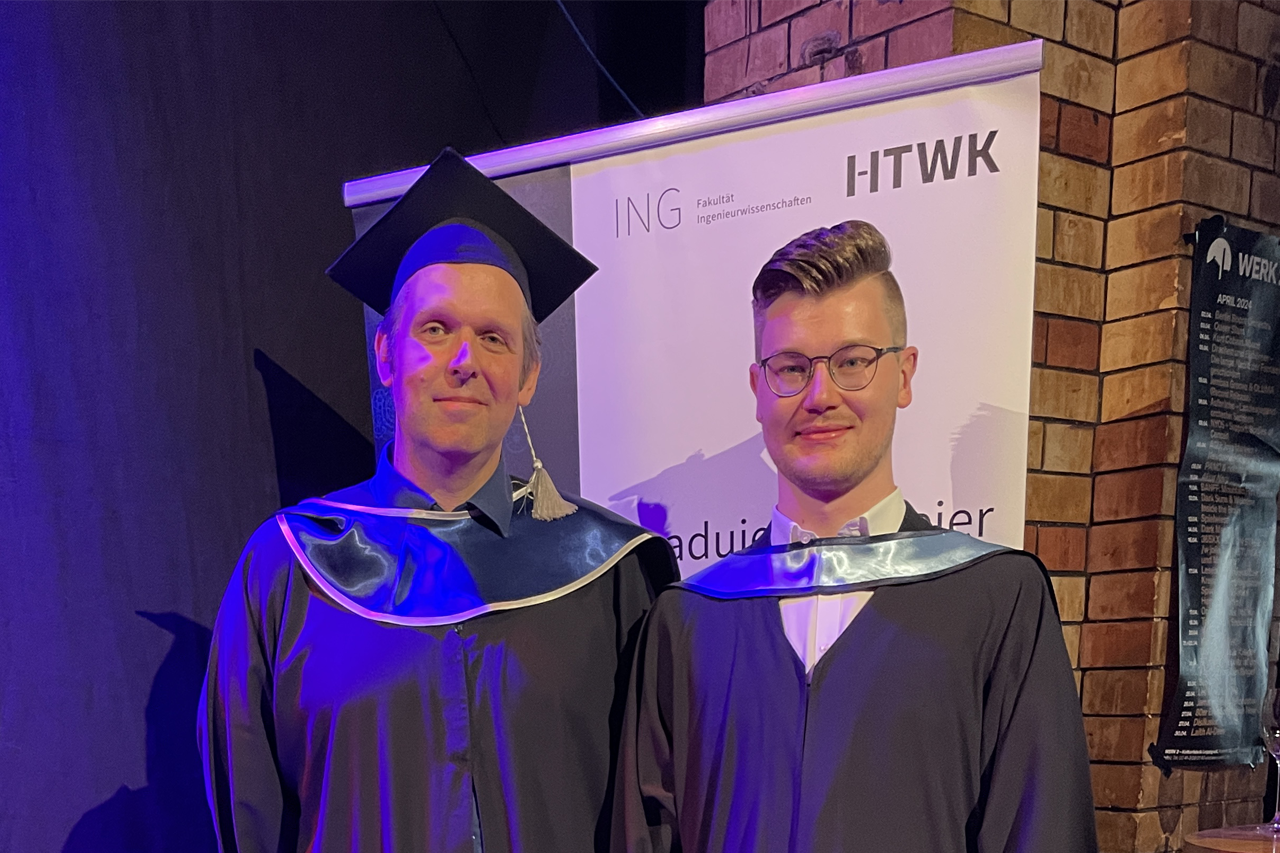
Gabriel Kahlmeyer | Master thesis mechanical engineering
"Design and development of a structural electrical energy storage system for aerospace applications "
The Master's thesis was supervised by Prof. Dr.-Ing. habil. Robert Böhm and M.Sc. Davood Peyrow Hedayati. The topic originates from research into multifunctional composite materials with an energy storage function.
The fundamental aim is to reduce the mass of aircraft. In the future, alternative energy sources can also be used for this purpose by means of energy efficiency. Gabriel Kahlmeyer's master's thesis specifically aims to use a structural electrical energy storage system in a drone. Various multifunctional energy storage systems are currently being researched for this purpose. These energy storage systems combine structural properties with electrochemical properties.
In his thesis, Kahlmeyer first identified a suitable structural energy storage system and then used a selected application to demonstrate the extent to which the flight time of a drone would be reduced according to the current state of research if the energy requirement were to be supplied entirely via a structural supercapacitor. In order to generate a meaningful, comparable and reproducible result, Gabriel Kahlmeyer used numerical simulations and technical calculations, which in turn can be used to make statements about the expected flight time. Furthermore, Kahlmeyer developed a new procedure for predicting the influence of structural effects on electrochemical properties. The simulation developed for this is based on the multi-physical finite element method and is linked to image processing. As part of the image processing, Kahlmeyer developed a Python algorithm, among other things.
The results are published in the scientific paper: "Numerical Simulation of the One-Way Mechanical-Electrochemical Coupling in Structural Supercapacitors", which Gabriel Kahlmeyer co-authored.
The master's thesis has been published on the HTWK publication server: https://nbn-resolving.org/urn:nbn:de:bsz:l189-qucosa2-874754
Gabriel Kahlmeyer is currently working as a CAE calculation engineer in industry.
Dominic Elias Taraba | Master's thesis in Electrical Engineering and Information Technology
"Implementation and validation of models for tactical planning in the context of automated driving"
In recent years, automated driving (AD) has become increasingly important in science and industry. Understanding the respective situation in road traffic is a basic prerequisite for executing collision-free, comfortable and rule-compliant manoeuvres. An explicit, knowledge-enriched model is necessary for the decision-making process in AD systems in order to be able to plan and execute robust, safe and comprehensible manoeuvres. The goal of manoeuvre planning is a sequence of those safe and compliant basic manoeuvres that a vehicle must perform in a constantly changing environment in order to reach a specified destination. The automated planning of manoeuvre sequences, based on a state space representation and taking into account boundary conditions and dynamics, is a challenging task for which a solution is proposed as part of the master's thesis. For deterministic manoeuvre planning in the context of automated driving, a framework consisting of a new planning language and corresponding algorithms is developed in the thesis and validated using selected road traffic scenarios. The developed planning language is domain-independent and can be used and extended in a modular way, so that applications outside the AD context are also conceivable. In addition to the deterministic solution of offline planning problems, the framework also enables the application to online planning problems and thus makes a relevant contribution to the planning of comprehensible and safe manoeuvres of automated vehicles in road traffic.
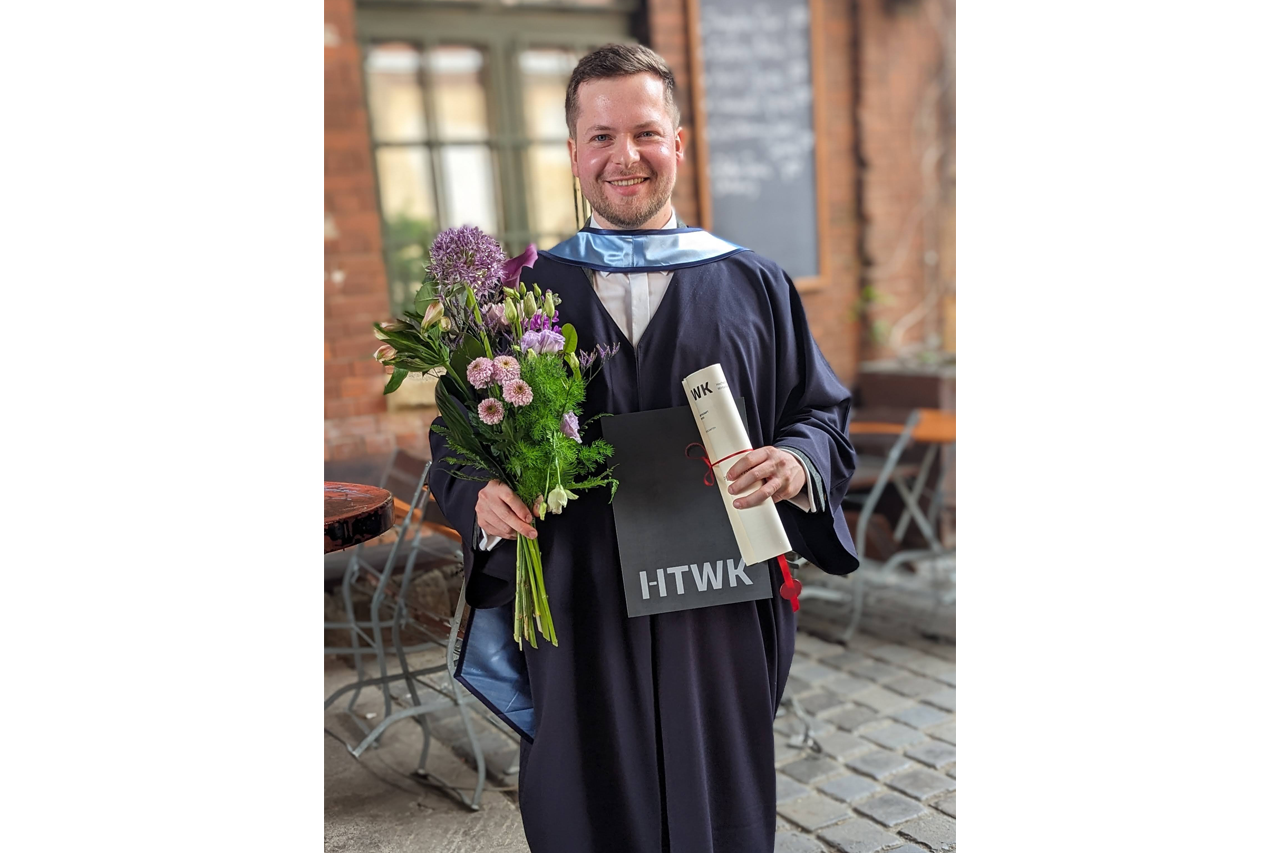
Sebastian Walther | Master's thesis in electrical engineering and information technology
"Development of a communication protocol between a PLC and an MQTT broker based on VDA5050 commands"
Sebastian Walther's master's thesis is intensively dedicated to the development of a communication protocol for standardisation in production plants. There are numerous companies in the industry that use their own protocols for control. The master's thesis is based on an effort to standardise these protocols so that future production systems can be set up more flexibly, quickly and easily.
I am particularly focussed on developing innovative solutions for current challenges in my field of research. The findings of my work contribute to the expansion of theoretical knowledge. This practical approach is a central aspect of my research philosophy and is reflected in my Master's thesis. Furthermore, my work is characterised by its interdisciplinary approach. The integration of findings from different disciplines enables a comprehensive analysis of the research subject and opens up new perspectives."
Congratulations
The Faculty of Engineering congratulates all award winners and wishes them every success for their future careers.
KARL KOLLE Foundation
The founder Karl Kolle saw it as his life's work to be involved in the social and societal environment. The declared aim of the foundation is therefore very much the "education and upbringing" of young people, both at home and abroad. The foundation was established in 1998 by Dortmund entrepreneur Karl Kolle. The foundation's assets are based on the company KODA Stanz- und Biegetechnik GmbH - a supplier to the automotive industry. In addition to education, the most important areas of support include "science and research". In this combination, the foundation awards scholarships for particularly outstanding students and prizes for excellent scientific work.
Since 2006, the KARL KOLLE Foundation has supported students at HTWK Leipzig during study visits abroad and honours students for outstanding technical and scientific theses. The Executive Board and the Board of Trustees of the KARL KOLLE Foundation jointly decide on the awarding of grants. The Board of Trustees comprises representatives from science, business and social fields of activity.